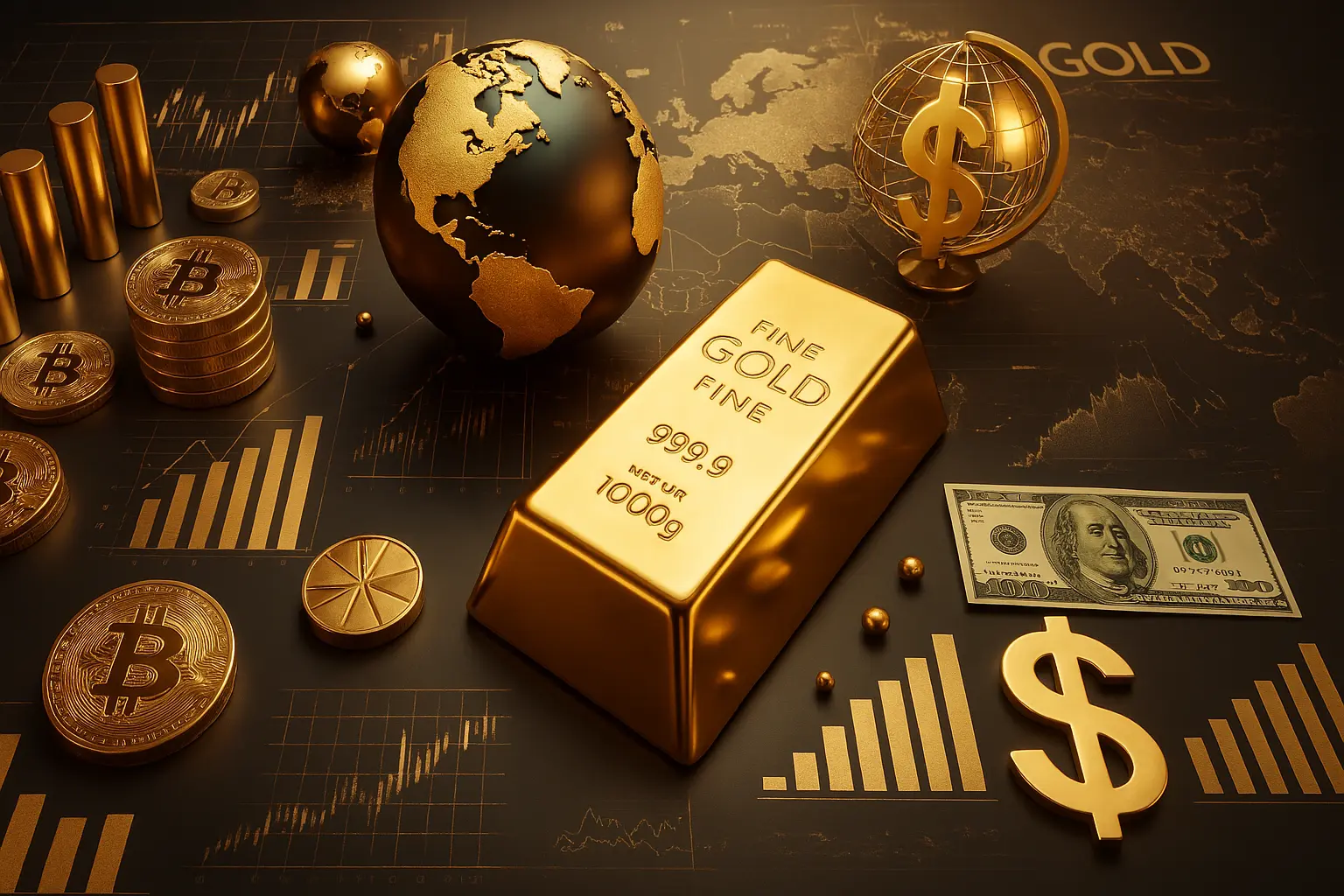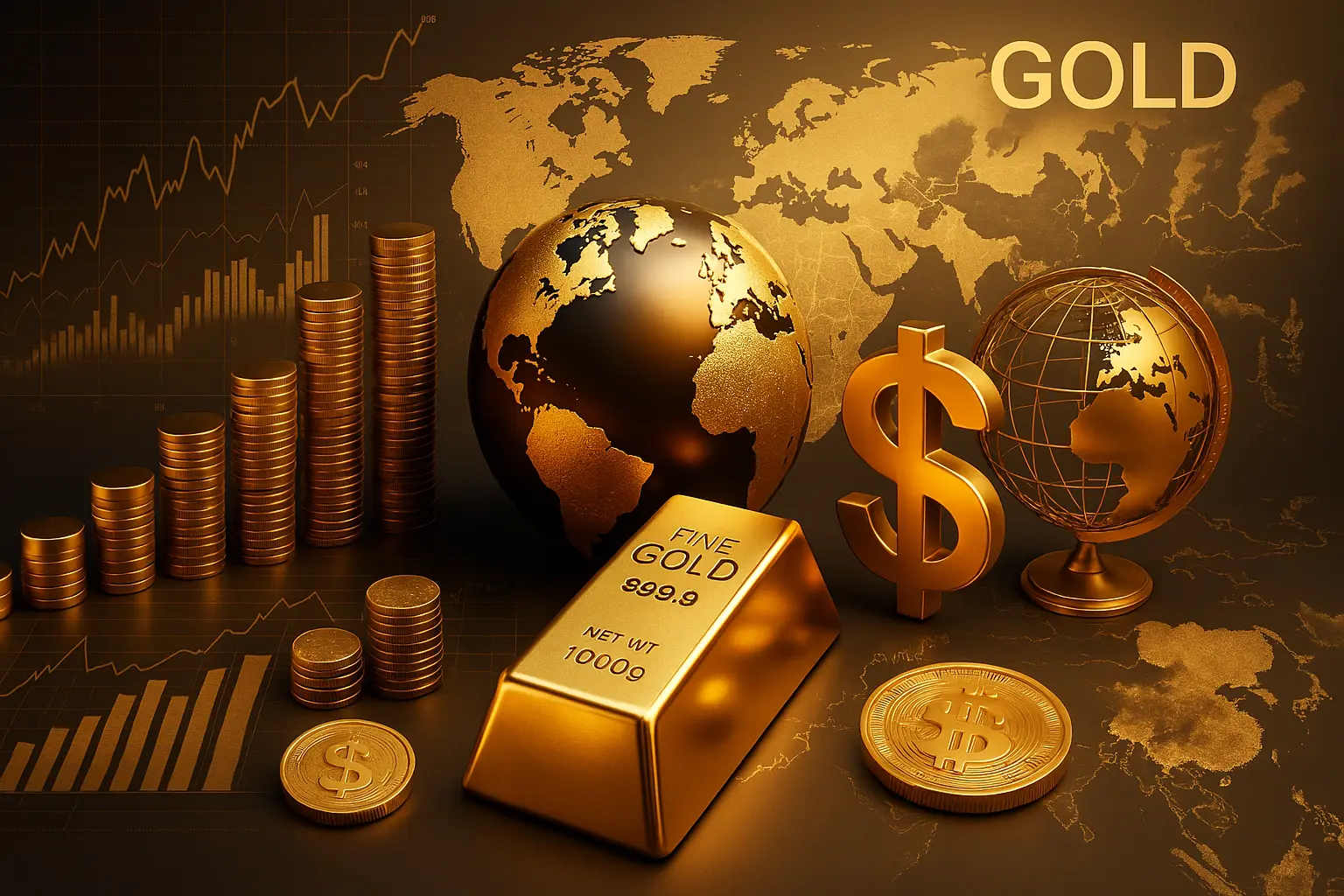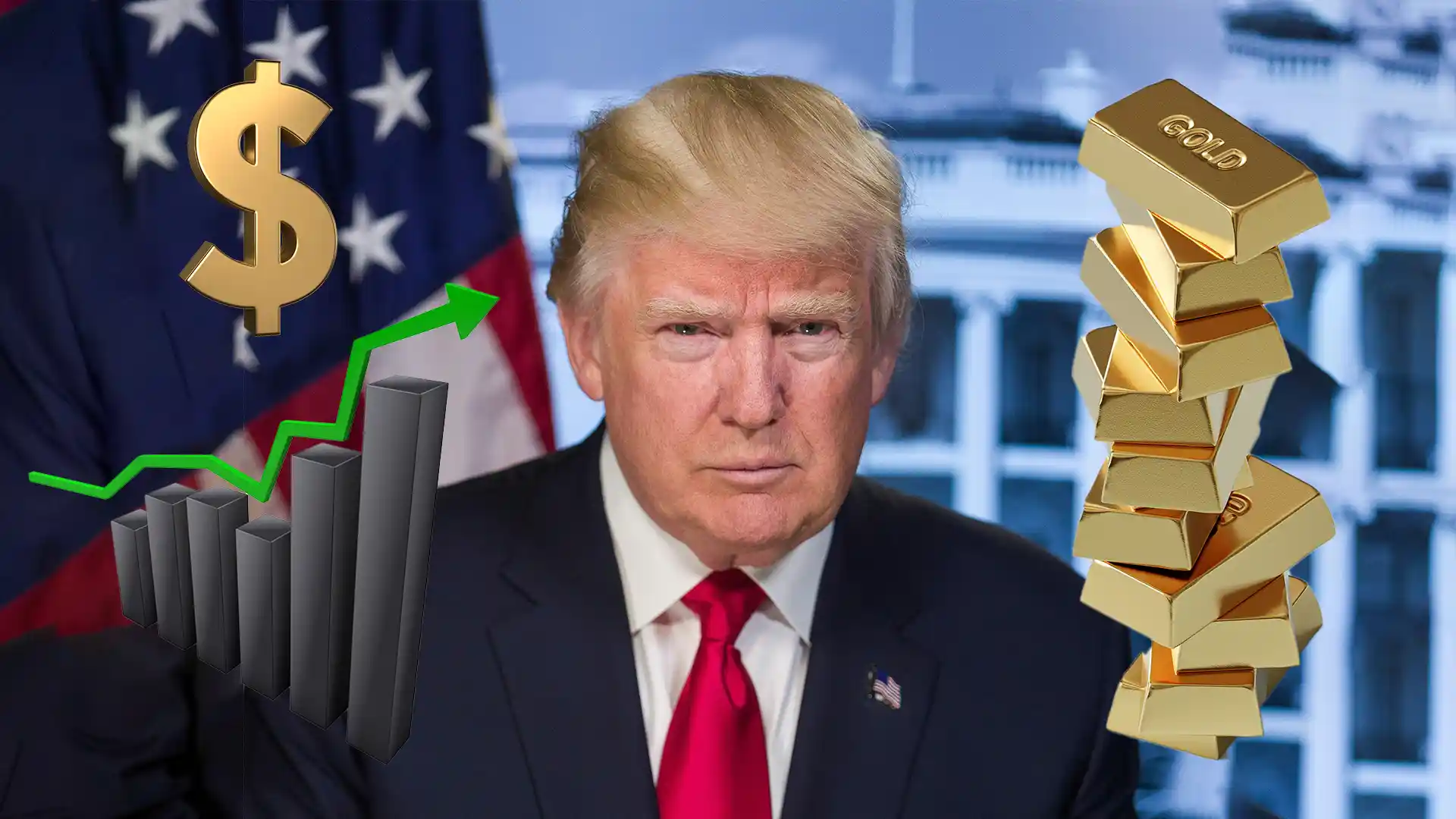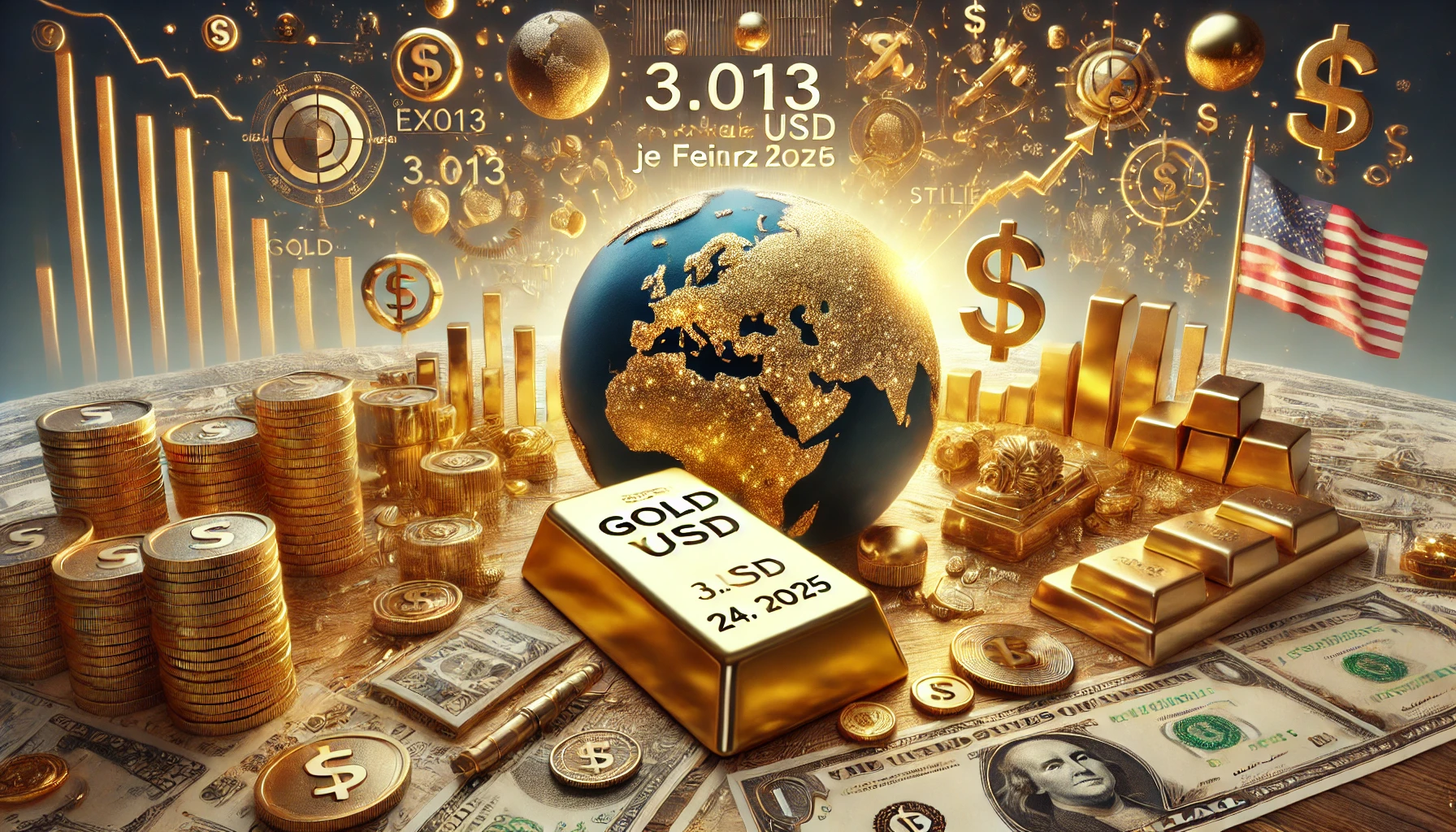Table of contents
Gold Price News: Stable at USD 2,654 - tech rally and interest rate expectations dominate the markets
Dr. Mathias Kunze
Senior Consultant in Commercial and Tax Law
8 min.
Published on: 16.12.2024 | 19:48 UTC
Updated on:
17.12.2024 | 22:04 UTC

Today's gold price and important market developments from 16.12.2024 in the live ticker
Source: ChatGPT (OpenAI)
Gold price at USD 2,654 - US dollar and interest rate expectations shape the price
At USD 2,654 per troy ounce, the price of gold is slightly higher today than at the end of the previous week. Despite geopolitical tensions, pressure remains from the strong US dollar, which is supported by robust economic data and ongoing interest rate speculation in the US.
While technology stocks such as the Nasdaq continue to rise and alternative investments such as Bitcoin are attracting capital, gold remains under pressure. Nevertheless, the precious metal remains a stable factor in many investors' portfolios in the face of global uncertainty.
Technology stocks fuel Nasdaq record run
The technology stock exchange Nasdaq 100 has continued its record run and reached new highs of 22,096 points. The latest upswing is being driven in particular by the ongoing expectation of further interest rate cuts by the US Federal Reserve and the strong performance of individual heavyweights such as Amazon, Tesla and Alphabet. These technology companies are considered to be particularly sensitive to interest rates, as their business models are often based on debt financing and they benefit significantly in an environment of low interest rates.
The decline in US economic data such as the somewhat weaker-than-expected purchasing managers' indices (S&P Global) and the Empire State Index reinforced the belief of many market participants that the Fed will cut interest rates again on Wednesday. This prospect boosted tech stocks in particular, which have been the big winners on the US stock market in recent months. Amazon marked new highs with a price increase of over 2%. Tesla and Alphabet were also supported by optimistic annual outlooks and continued investor interest.
Analysts point out that the Nasdaq acts as an “interest rate barometer” for the US markets. Falling interest rates favor companies whose long-term profits are valued higher - a factor that makes technology stocks particularly attractive. Despite the rally, some experts are urging caution. “The valuation level of individual tech stocks has again reached heights reminiscent of the time before the correction at the beginning of 2022,” says a Citibank expert. Nevertheless, the sector remains the strongest anchor for many investors in an environment characterized by uncertainty.
DAX between correction and hope for Christmas rally
The German stock market is showing slight weakness at the start of the week, after the DAX recently reached a new record high of 20,523 points. The fall of 0.45% to 20,313 points indicates a certain restraint on the part of investors, who are more concerned with hedging their positions after the recent price gains. Experts are debating whether the DAX will initiate a technical correction or whether the market can still benefit from the so-called “Christmas rally” in the remaining trading days of the year.
With an annual increase of 22%, the DAX is one of the strongest global indices, but the air is gradually getting thinner. “The upward price gap from the beginning of December at 20,085/20,038 points is now forming the first line of retreat,” analyze experts from HSBC. Some market observers, such as Christian Henke from IG Markets, consider the technical potential of the leading German index to be “largely exhausted”. A setback towards this support zone would therefore come as no surprise.
On the other hand, ING chart technician Christian Zoller points to the historically positive seasonality from mid-December. The hope of a Christmas rally, which is traditionally driven by a combination of low trading volumes and positive year-end results, remains a relevant factor. If the DAX defends the psychological level of 20,300 points, new buyers could enter the market and drive prices towards the previous record high.
ECB interest rate cuts put pressure on the euro
Christine Lagarde, President of the European Central Bank (ECB), signaled further interest rate cuts in a speech in Lithuania. Lagarde emphasized that the current economic data would confirm the expectation that the monetary policy course in the eurozone would have to be eased. The deposit rate currently stands at 3.0%, but could be gradually lowered in the coming year.
This statement weighed on the euro, which is struggling with the USD 1.05 mark. A narrowing interest rate advantage of the eurozone over other regions - particularly the USA - reduces the attractiveness of the common currency for international investors. The prospect of lower interest rates also points to continued economic weakness in Europe, where economic indicators have recently been below expectations. Although the Purchasing Managers' Index for the eurozone rose slightly to 49.5 points, it continues to signal a decline in economic activity.
However, the weakness of the euro could bring advantages for export-oriented companies in the eurozone - especially in Germany. A weak euro makes European products cheaper on the global market, which strengthens competitiveness. At the same time, uncertainty remains high as to how much the ECB will actually cut interest rates if inflation rises again next year.
Oil prices under pressure despite geopolitical risks
Oil prices fell slightly on the commodities market.North Sea Brent crude oil fell by 0.7% to USD 73.76 per barrel.The decline reflects ongoing concerns about weaker global demand, particularly in view of the slowdown in economic momentum in Europe and China. However, a sharper fall in prices was limited by geopolitical tensions.Fears that new US sanctions against Russia and Iran could affect oil supplies supported prices.Russia and Iran are among the largest oil producers in the world.Any sanctions would place a heavy burden on supplies from these countries.
Market observers expect the geopolitical situation to continue to cause volatility in the coming weeks.If OPEC+ adjusts its production policy or sanctions are tightened, the oil price could come under upward pressure again.Analysts at Bank of America expect Brent crude oil to trade in a range between USD 72 and USD 78 in the short term.
Bitcoin reaches new record high due to Trump plans
Bitcoin has reached a new record high of USD 107,819. The renewed price rise was triggered by statements made by US President-elect Donald Trump, who talked about creating a strategic Bitcoin reserve for the USA. This surprising announcement boosted the already sharp rise in demand for the cryptocurrency.
Bitcoin is considered an alternative to traditional currencies and is seen by many investors as protection against inflation and geopolitical uncertainties.Trump's positive stance on cryptocurrencies could mark a paradigm shift in US financial policy, which would have far-reaching implications for the global financial world.
The record rise of Bitcoin is taking place in an environment of growing institutional acceptance.More and more companies and asset managers are integrating Bitcoin into their portfolios, further driving demand.At the same time, the Bitcoin hype is being reinforced by speculation about possible regulatory easing in the USA and its increasing establishment as digital gold.However, experts warn of the high volatility: “Bitcoin remains a speculative asset with extreme price fluctuations,” says an analyst from JP Morgan. Nevertheless, the euphoria remains unbroken.If the current trend continues, the price could rise to USD 110,000.
VW and IG Metall: Decisive collective bargaining round before Christmas
The potentially decisive wage negotiations between Volkswagen and IG Metall are currently underway in Hanover. The aim is to resolve the deadlocked dispute over wage cuts, planned plant closures and the threat of redundancies before the holidays. The talks are challenging in view of the hardened fronts, but both sides emphasize the urgency of reaching an agreement.
Volkswagen insists on cost reductions in order to ensure competitiveness. In particular, the high production costs in Germany are putting the company under pressure. IG Metall negotiator Thorsten Gröger counters that the employees must not bear the burden of the austerity measures. He is demanding a fair wage increase and no job cuts.
With massive warning strikes already disrupting operations nationwide, the talks are of great importance. Failure to reach an agreement could result in further work stoppages and put a heavy strain on production. Experts expect a final decision on Tuesday at the earliest. A compromise would take the pressure off both sides before the end of the year.
Porsche SE expects billions in write-downs
Porsche Automobil Holding SE will probably have to write off billions due to the weakening development of its core investments in Volkswagen and Porsche AG. The previous profit forecasts of 2.4 to 4.4 billion euros after tax cannot be maintained.
The reasons for the write-downs lie in particular in the challenges at Volkswagen: a significant slump in profits, high production costs and the planned austerity measures have weighed on the valuation of the investments. Porsche SE, as the main shareholder of VW and Porsche, is now responding with a revaluation of its assets.
Analysts warn that the write-downs are a clear signal of the existing structural problems in the industry. In particular, the transformation to electromobility and the international competitive environment are putting companies under pressure. Porsche SE must present new strategies in the coming months in order to overcome the financial impact and stabilize investor confidence.
Russian military support from North Korea: G7 condemn cooperation
Reports from Ukrainian military intelligence indicate that Russia has reinforced its troops in the Kursk border region with North Korean soldiers. Due to high losses on the front line, Moscow is increasingly filling its units with soldiers from Pyongyang. More than 10,000 North Korean soldiers are already said to be supporting Russia in the war, which has alarmed the international community.
The G7 countries as well as South Korea, Australia, New Zealand and the EU reacted with harsh criticism. In a joint statement, they condemned the military cooperation between Russia and North Korea as a “dangerous expansion of the conflict” with serious consequences for the global security situation. In particular, the delivery of North Korean artillery shells and missiles to Russia as well as the military training of North Korean forces is a clear violation of UN resolutions.
Experts warn that the cooperation could further exacerbate the tense situation on the Korean peninsula. In addition, the connection between Moscow and Pyongyang threatens to further prolong the war in Ukraine and intensify geopolitical tensions.
Trump demands concessions from Kiev and criticizes US arms deliveries
US President-elect Donald Trump is increasing the pressure on Ukraine to end the war through negotiations. In a speech, Trump demanded “concessions” from Kiev and emphasized that the conflict must be ended quickly. However, he left specific details of his plans open.
At the same time, Trump condemned the Biden administration's decision to authorize attacks by Ukraine with long-range US weapons on Russian territory. He said this was “very stupid” and would only escalate the conflict further. Trump announced that he may reverse this decision once he takes office in January 2025.
Trump's comments caused international unrest. While Russia sees its position confirmed and is increasing the pressure on Kiev, there is growing concern in Ukraine that US support could be significantly reduced under Trump. The next few months are likely to be decisive in determining how US policy towards Ukraine will develop under the new administration.
Scholz loses vote of confidence and prepares for new elections
As expected, Federal Chancellor Olaf Scholz has lost the vote of confidence in the Bundestag, paving the way for new elections next year. In the vote, 207 MPs voted for Scholz, 394 against him and 116 abstained. Scholz therefore fell well short of the necessary majority of 367 votes. Immediately afterwards, the Chancellor met with Federal President Frank-Walter Steinmeier to request the dissolution of the Bundestag.
New elections are scheduled for February 23, 2025, provided Steinmeier agrees, which is considered likely. Scholz justified the decision with the need for a fundamental decision on Germany's future political direction. He emphasized that the citizens must now determine the country's course. By losing the vote of confidence, Scholz has officially ended the already fragile traffic light coalition and thus drawn a clear line in the sand.
Reactions to the vote of confidence are divided. While the CDU under Friedrich Merz blames the failed Federal Chancellor Olaf Scholz for the political chaos, representatives of the SPD see the decision as a necessary turning point. The next few weeks will be marked by an intense election campaign, which is likely to be dominated by economic issues and the future of aid to Ukraine.
Scholz reaffirms Germany's role as a leading supporter of Ukraine
In his speech on the vote of confidence, Federal Chancellor Olaf Scholz emphasized that Germany will continue to play the leading role in supporting Ukraine in Europe. “Germany is the biggest supporter of Ukraine in Europe, and that will remain so,” explained Scholz. However, he made it clear that there were clear limits to this commitment: A delivery of cruise missiles or a deployment of German ground troops was out of the question for him. “Not with me as Chancellor,” Scholz emphasized once again.
Scholz emphasized that the German government would do everything in its power to strengthen Ukraine militarily and economically without jeopardizing Germany's security. “We stand firmly by Ukraine's side, but always with a sense of proportion,” he said. On the one hand, this position is intended to secure support for Kiev, but on the other hand to calm domestic political concerns and fears of a direct escalation with Russia.
Scholz's statements are seen as an attempt to strike a balance between the need for international solidarity and demands for a cautious foreign policy. Germany's Ukraine policy will remain a key issue, particularly in view of the new elections, and will be closely monitored by the opposition.
Technical analysis: Gold price remains in a sideways trend
The gold price is currently trading at USD 2,654 per troy ounce. From a technical perspective, the price is moving within a narrow range, which indicates a sideways movement without any clear impetus.
The next support zone is USD 2,640, a level that has already held in recent days. A downward break could push the price further towards the psychologically important USD 2,600 mark. On the upside, the USD 2,680 to 2,700 range is seen as resistance, which is likely to be difficult to overcome in the short term. However, a break of this level could trigger an upward trend with a target range of USD 2,720.
The technical indicators are currently mixed: the Relative Strength Index (RSI) is in neutral territory at around 52, reflecting neither overbought nor oversold signals. At the same time, the price is trading just below the 50-day moving average, which indicates a wait-and-see attitude on the part of market participants.
Market outlook: Focus on monetary policy and geopolitical risks
The short-term development of the gold price will be strongly influenced by monetary policy decisions and geopolitical tensions. The upcoming interest rate cut by the US Federal Reserve on Wednesday could strengthen the gold price. Lower interest rates reduce the opportunity costs of gold, making the precious metal more attractive for investors.
At the same time, geopolitical risks such as the ongoing tensions between Russia and Ukraine and the escalations in the Middle East remain a driving factor for the demand for safe investments. These uncertainties could motivate further investors in gold if the situation worsens.
An additional boost could come from the weakness of the euro. ECB President Christine Lagarde's statements on further interest rate cuts have put pressure on the single currency, making gold more expensive for European investors in dollar terms. If the weakness of the euro continues, increased buying by European investors could support the price.
On the demand side, China remains a key player. China has stepped up its gold purchases in recent months in order to expand its reserves. Together with the typical seasonal demand for gold from India at the end of the year, this could also stabilize the gold price.
Analysts expect the sideways movement to continue in the short term, although a breakthrough to the upside remains possible due to positive stimuli such as stronger geopolitical risks or a more significant interest rate cut. However, should the US Federal Reserve signal a stricter stance, the gold price could come under renewed pressure.
Dr. Mathias Kunze
Senior Consultant in Commercial and Tax Law
Blog

All-time high: Gold price breaks through USD 3,000 for the first time

Gold in industry: A detailed analysis of its interactions with halogens and in cyanide solutions







